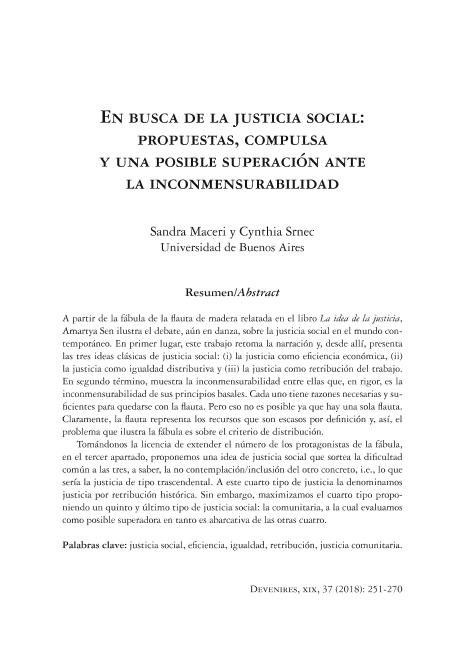Mostrar el registro sencillo del ítem
dc.contributor.author
Maceri, Sandra Beatriz

dc.contributor.author
Srnec, Cynthia Cecilia

dc.date.available
2019-11-01T20:33:52Z
dc.date.issued
2018-06
dc.identifier.citation
Maceri, Sandra Beatriz; Srnec, Cynthia Cecilia; En busca de la justicia social: propuestas, compulsa y una posible superación ante la inconmensurabilidad; Universidad Michoacana de San Nicolás de Hidalgo. Facultad de Filosofía “Dr. Samuel Ramos Magaña”; Devenires; XIX; 37; 6-2018; 251-270
dc.identifier.issn
1665-3319
dc.identifier.uri
http://hdl.handle.net/11336/87860
dc.description.abstract
A partir de la fábula de la flauta de madera relatada en el libro La idea de la justicia, Amartya Sen ilustra el debate, aún en danza, sobre la justicia social en el mundo contemporáneo. En primer lugar, este trabajo retoma la narración y, desde allí, presenta las tres ideas clásicas de justicia social: (i) la justicia como eficiencia económica, (ii) la justicia como igualdad distributiva y (iii) la justicia como retribución del trabajo. En segundo término, muestra la inconmensurabilidad entre ellas que, en rigor, es la inconmensurabilidad de sus principios basales. Cada uno tiene razones necesarias y suficientes para quedarse con la flauta. Pero eso no es posible ya que hay una sola flauta. Claramente, la flauta representa los recursos que son escasos por definición y, así, el problema que ilustra la fábula es sobre el criterio de distribución. Tomándonos la licencia de extender el número de los protagonistas de la fábula, en el tercer apartado, proponemos una idea de justicia social que sortea la dificultad común a las tres, a saber, la no contemplación/inclusión del otro concreto, i.e., lo que sería la justicia de tipo trascendental. A este cuarto tipo de justicia la denominamos justicia por retribución histórica. Sin embargo, maximizamos el cuarto tipo proponiendo un quinto y último tipo de justicia social: la comunitaria, a la cual evaluamos como posible superadora en tanto es abarcativa de las otras cuatro.
dc.description.abstract
From the fable of the wooden flute related in the book The Idea of Justice, Amartya Sen illustrates the still in course debate, about social justice in the contemporary world. In the first place this article refers to the main issue from the fable and, from there, presents the three classic ideas of social justice: (i) justice as economic efficiency, (ii) justice as distributive equality and (iii) justice as compensation for work. In the second place, it shows the incommensurability between them that, specifically, is the incommensurability of their basal principles. Each of the three children from the fable has the reasons enough to keep the flute. But, since there is only one flute, that cannot be possible. Clearly, the flute represents the resources that are scarce by definition and, thus, the problem that illustrates the fable is about the distribution criteria. Taking the license to extend the protagonists of the fable, in the third section, we propose a fourth idea of social justice that eludes the common difficulty of the original three, specifically, the non-contemplation of the concrete other, not transcendental, that we designated as justice for historical retribution. However, we maximize the fourth type by proposing a fifth and last type of social justice: the community type, which we evaluate as a possible overcoming as it encompasses the other four.
dc.format
application/pdf
dc.language.iso
spa
dc.publisher
Universidad Michoacana de San Nicolás de Hidalgo. Facultad de Filosofía “Dr. Samuel Ramos Magaña”
dc.rights
info:eu-repo/semantics/openAccess
dc.rights.uri
https://creativecommons.org/licenses/by-nc-sa/2.5/ar/
dc.subject
JUSTICIA SOCIAL
dc.subject
EFICIENCIA
dc.subject
IGUALDAD
dc.subject
RETRIBUCIÓN
dc.subject
JUSTICIA COMUNITARIA
dc.subject.classification
Filosofía, Historia y Filosofía de la Ciencia y la Tecnología

dc.subject.classification
Filosofía, Ética y Religión

dc.subject.classification
HUMANIDADES

dc.title
En busca de la justicia social: propuestas, compulsa y una posible superación ante la inconmensurabilidad
dc.title
In search of social justice: proposals, confrontation and a possible overcoming in the
face of incommensurability
dc.type
info:eu-repo/semantics/article
dc.type
info:ar-repo/semantics/artículo
dc.type
info:eu-repo/semantics/publishedVersion
dc.date.updated
2019-10-16T17:35:23Z
dc.identifier.eissn
2395-9274
dc.journal.volume
XIX
dc.journal.number
37
dc.journal.pagination
251-270
dc.journal.pais
México

dc.journal.ciudad
Michoacán
dc.description.fil
Fil: Maceri, Sandra Beatriz. Consejo Nacional de Investigaciones Científicas y Técnicas. Oficina de Coordinación Administrativa Saavedra 15. Instituto Interdisciplinario de Economía Política de Buenos Aires. Universidad de Buenos Aires. Facultad de Ciencias Económicas. Instituto Interdisciplinario de Economía Política de Buenos Aires; Argentina. Universidad de Buenos Aires. Facultad de Ciencias Económicas. Instituto de Investigaciones Económicas. Centro de Investigaciones en Epistemología de las Ciencias Económicas; Argentina
dc.description.fil
Fil: Srnec, Cynthia Cecilia. Consejo Nacional de Investigaciones Científicas y Técnicas. Oficina de Coordinación Administrativa Saavedra 15. Instituto Interdisciplinario de Economía Política de Buenos Aires. Universidad de Buenos Aires. Facultad de Ciencias Económicas. Instituto Interdisciplinario de Economía Política de Buenos Aires; Argentina
dc.journal.title
Devenires
dc.relation.alternativeid
info:eu-repo/semantics/altIdentifier/url/http://devenires.umich.mx/2017/02/02/hola-mundo/
dc.relation.alternativeid
info:eu-repo/semantics/altIdentifier/url/http://devenires.umich.mx/devenires-37-numero-actual/
dc.relation.alternativeid
info:eu-repo/semantics/altIdentifier/url/http://devenires.umich.mx/wp-content/uploads/2018/09/Sandra-Maceri-y-Cynthia-Srnec.pdf
Archivos asociados
